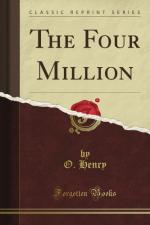Then, in a cab, you are not even an occupant; you are contents. You are a cargo at sea, and the “cherub that sits up aloft” has Davy Jones’s street and number by heart.
One night there were sounds of revelry in the big brick tenement-house next door but one to McGary’s Family Cafe. The sounds seemed to emanate from the apartments of the Walsh family. The sidewalk was obstructed by an assortment of interested neighbours, who opened a lane from time to time for a hurrying messenger bearing from McGary’s goods pertinent to festivity and diversion. The sidewalk contingent was engaged in comment and discussion from which it made no effort to eliminate the news that Norah Walsh was being married.
In the fulness of time there was an eruption of the merry-makers to the sidewalk. The uninvited guests enveloped and permeated them, and upon the night air rose joyous cries, congratulations, laughter and unclassified noises born of McGary’s oblations to the hymeneal scene.
Close to the curb stood Jerry O’Donovan’s cab. Night-hawk was Jerry called; but no more lustrous or cleaner hansom than his ever closed its doors upon point lace and November violets. And Jerry’s horse! I am within bounds when I tell you that he was stuffed with oats until one of those old ladies who leave their dishes unwashed at home and go about having expressmen arrested, would have smiled—yes, smiled—to have seen him.
Among the shifting, sonorous, pulsing crowd glimpses could be had of Jerry’s high hat, battered by the winds and rains of many years; of his nose like a carrot, battered by the frolicsome, athletic progeny of millionaires and by contumacious fares; of his brass-buttoned green coat, admired in the vicinity of McGary’s. It was plain that Jerry had usurped the functions of his cab, and was carrying a “load.” Indeed, the figure may be extended and he be likened to a bread-waggon if we admit the testimony of a youthful spectator, who was heard to remark “Jerry has got a bun.”
From somewhere among the throng in the street or else out of the thin stream of pedestrians a young woman tripped and stood by the cab. The professional hawk’s eye of Jerry caught the movement. He made a lurch for the cab, overturning three or four onlookers and himself—no! he caught the cap of a water-plug and kept his feet. Like a sailor shinning up the ratlins during a squall Jerry mounted to his professional seat. Once he was there McGary’s liquids were baffled. He seesawed on the mizzenmast of his craft as safe as a Steeple Jack rigged to the flagpole of a skyscraper.
“Step in, lady,” said Jerry, gathering his lines. The young woman stepped into the cab; the doors shut with a bang; Jerry’s whip cracked in the air; the crowd in the gutter scattered, and the fine hansom dashed away ’crosstown.
When the oat-spry horse had hedged a little his first spurt of speed Jerry broke the lid of his cab and called down through the aperture in the voice of a cracked megaphone, trying to please:




